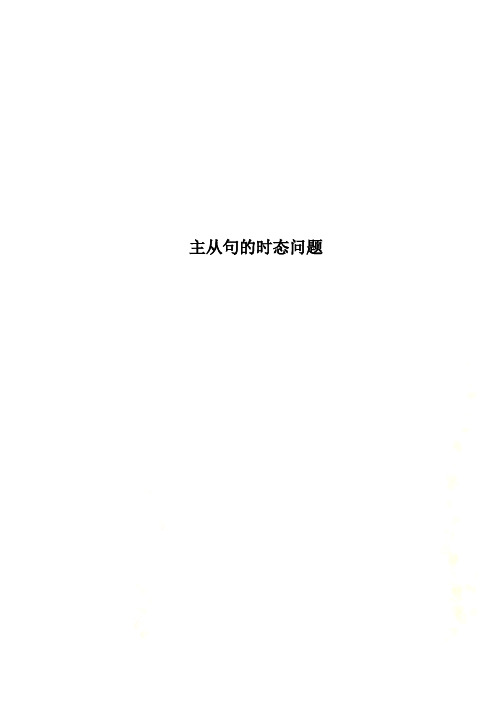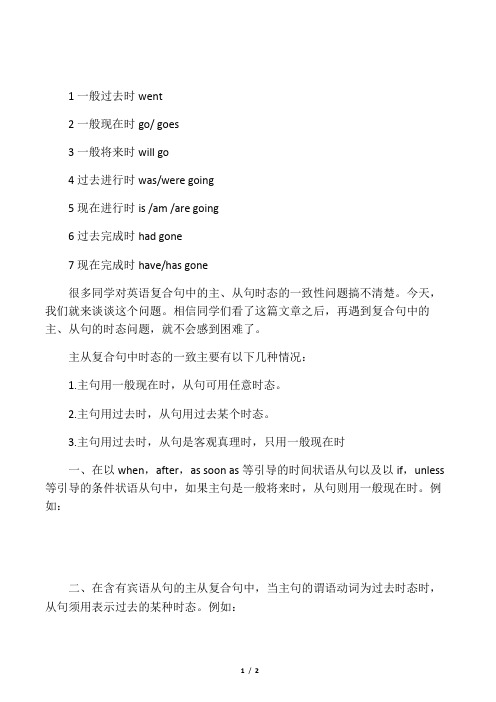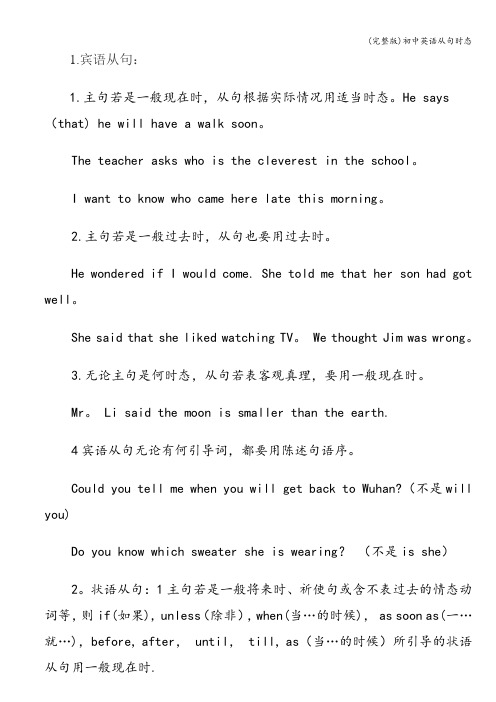主从句的时态问题
主从句的时态问题

主从句的时态问题从句和主句中谓语动词的时态在复合句中,主句和从句的谓语动词时态一般遵循以下的规律:一① 在以下三种主语从句中,主语从句的谓语动词要用“should+动词原形”, should可省略。
(1)It is+形容词+that…句型。
常见的形容词有important, necessary, natural, funny, strange, surprising, astonishing(令人惊讶的)等。
(2) It is +名词+that…句型。
常见的名词有pity, shame, advice, suggestion, proposal(提议,建议), requirement, request, desire, order 等。
(3) It is+动词的过去分词+ that…句型。
常见的动词有advise, order, propose, request, suggest, demand, require等。
②在insist(坚持), urge (催促), order(命令), command(命令),suggest(建议),advise(建议),recommend(建议,推荐), request(请求,要求), demand(要求),require(要求,需要)等动词后的宾语从句中,谓语动词用“should+动词原形”, should可省略。
③ 在含有advice, order, demand, proposal(提议), requirement, suggestion等名词的表语从句、同位语从句中,谓语动词用“should+动词原形”,should可省略。
④在一些表示惊讶、意志等感情色彩的名词性从句中,谓语动词用“should+动词原形”或“should +have done”,译为“竟然,居然”。
例如:I am surprised /shocked that you should speak in such a way。
主句是过去式从句用什么时态

主句是过去式从句用什么时态
1.主句用一般现在时,从句可用任意时态,可归纳为“主现从不限”;
2.主句用过去时,从句用过去某个时态,可归纳为“主过从四过”;
3.主句用过去时,从句是科学真理、客观常识、名人格言时用一般现在时;
4.情态动词could/would用于“请求”,表示委婉、客气的语气时,从句不受主句的约束。
由引导词if或unless引导的状语从句叫做条件状语从句。
在英文中,条件是指某一件事情实现之后(状语从句中的动作),其它事情(主句中的动作)才能发生,通常译作“假如”。
注意:在含有条件状语从句的复合句中,表示将来时态,主句是一般将来时态,祈使句或情态动词,从句要用现在时态,[主将从现原则](主将从现,将并非指将来时,还指表示将来含义的,跟着if后的那句话是从句。
语法引导条件状语从句最常用的连词是if,由if引导的条件状语从句表示在某种条件下某事很可能发生。
如:
1)If you ask him,he will help you.
如果你请他帮忙,他会帮你的。
2)If you fail in the exam,you will let him down.
如果你考试不及格,你会让他失望的
if引导的条件状语从句既可以将从句放前面也可以将从句放后面
(如果天下雨,我们就不玩了)If it rains,we will stop playing.
转为We will stop playing if it rains.。
从句中时态运用的注意点

until,as soon as, before, after,after as,than,whether,where 等 引导的从句
、由if引导的条件状语从句、关系代词和正式的演讲中。 下面我们小结下从句中时态运用的注意点。1.一般现在时 表示将来。当主句为将来时态或
:I’ll give you anything you ask for. 你要什么我都给你。You can have anythin
g I find. 我找到的任何东西你都可以拿去。Everyone who comes first will get a prese
nt. 每个先来的人都可得到一份礼物。2.一般过去时表示 现在①由if引导的虚拟条件句,要用一般过去时表示现在。 如:If I had
lots of money,I'd give some to anybody who asked for it. (NOT...who
would ask for it)如果我有很多钱,我将给任何找我要的 人。If I had the money now I’d bu
y a car. 假若我现在有钱,我就买辆小汽车。②宾语从句 中,由于时态呼应的关系,可用一般过去时表示现在。 如:I didn’t k
er when I'll arrive。我想知道什么时候我能到达。I don't know if I'll be here tomo
rrow.我不知道我是否明天在这儿。
全文完!
北京同声传译公司 ty19htvv
her until the plane takes off.我将呆在这里直到飞机降落。 She'll be on the same
初中英语主句从句时态关系例句

初中英语主句从句时态关系例句宾语从句中,从句谓语动词的时态要与主句谓语动词的时态相呼应,主要体现在三个方面:1.主句的谓语动词是一般将来时、一般现在时或主句是祈使句时,从句的谓语动词根据实际情况选用具体的时态。
例如:It’s reported that Nanjing South Railway Station at the end of this month. (2011南京)A.has been completedB.is completedC.was completedD.will be completed此题中,从句的时间状语表示将来at the end of this month,主句又为现在时,故从句用将来时。
2.主句的谓语动词是一般过去时,从句的时态要相应地使用与过去相对应的时态,即一般将来时与过去将来时,一般现在时与一般过去时,现在完成时与过去完成时相对应。
例如:The woman asked the policeman where__.(2011重庆)A.the post officeB.the post office wasC.is the post officeD.was the post office 这道考题中,主句动词时态用了过去时,故从句应由原来的一般现在时改为一般过去时。
另外,有必要注意两个特殊的词would和could,它们常出现在中考题中。
would和could 经常用于表示客气、委婉的语气,不表示过去,从句时态应根据实际情况而定。
例如:(1)—Excuse me,I want to go to the 21st National BookExpo(展览会).Could you tell me__?—Sure.It is at No.3 Changjiang Road in Harbin.(2011哈尔滨)A.where it isB.where it wasC.where is it(2)—Would you please tell me__?—At 10:00 this evening.(2010福建晋江)A.when will the train leaveB.when the train will leaveC.when does the train leave3.如果从句反映的是科学事实、客观真理、名言警句时,时态一律都是一般现在时,不管主句用什么时态。
初中英语复合句中主、从句的时态问题

1一般过去时went2一般现在时go/ goes3一般将来时will go4过去进行时was/were going5现在进行时is /am /are going6过去完成时had gone7现在完成时have/has gone很多同学对英语复合句中的主、从句时态的一致性问题搞不清楚。
今天,我们就来谈谈这个问题。
相信同学们看了这篇文章之后,再遇到复合句中的主、从句的时态问题,就不会感到困难了。
主从复合句中时态的一致主要有以下几种情况:1.主句用一般现在时,从句可用任意时态。
2.主句用过去时,从句用过去某个时态。
3.主句用过去时,从句是客观真理时,只用一般现在时一、在以when,after,as soon as等引导的时间状语从句以及以if,unless 等引导的条件状语从句中,如果主句是一般将来时,从句则用一般现在时。
例如:二、在含有宾语从句的主从复合句中,当主句的谓语动词为过去时态时,从句须用表示过去的某种时态。
例如:He asked when they would go to the party.他问他们什么时候将去参加聚会。
Miss Green said she had been to Beijing before.格林小姐说她以前曾经去过北京。
三、在宾语从句中,当主句的时态为一般现在时、现在进行时、现在完成时等时态时,后面从句时态不受主句限制,可根据情况,选用各种适合的时态。
例如:Do you know when we'll have a football match?你知道我们什么时候举行足球赛吗?You know he has gone to Shanghai.你知道他已去上海了。
四、当宾语从句表述的是客观事实、科学真理、现在的习惯动作以及格言等时,其时态不受主句限制,而用一般现在时。
例如:The teacher told us that light travels faster than sound.老师告诉我们光速比音速要快。
(完整版)初中英语从句时态

1.宾语从句:1.主句若是一般现在时,从句根据实际情况用适当时态。
He says (that) he will have a walk soon。
The teacher asks who is the cleverest in the school。
I want to know who came here late this morning。
2.主句若是一般过去时,从句也要用过去时。
He wondered if I would come. She told me that her son had got well。
She said that she liked watching TV。
We thought Jim was wrong。
3.无论主句是何时态,从句若表客观真理,要用一般现在时。
Mr。
Li said the moon is smaller than the earth.4宾语从句无论有何引导词,都要用陈述句语序。
Could you tell me when you will get back to Wuhan?(不是will you)Do you know which sweater she is wearing?(不是is she)2。
状语从句:1主句若是一般将来时、祈使句或含不表过去的情态动词等,则if(如果), unless(除非),when(当…的时候), as soon as(一…就…),before, after, until, till, as(当…的时候)所引导的状语从句用一般现在时.You may take a rest when you finish doing your work。
I will call you up if I leave for Shanghai next week.Wait for your brother at the bus station until he arrives.2而主句若是一般过去时,从句也要用过去时,如:I would give the money to the charity if I had a million dollars。
when引导的从句和主句用什么时态

when引导的从句和主句用什么时态
时间状语从句中,如果主句是现在的时态(现在进行时、现在完成时或一般现在时),从句可以用任意时态;如果主句是过去的时态(一般过去时、过去完成时、过去进行时、过去将来时),从句时态也必须用过去的时态(过去进行时、过去完成时、一般过去时、过去将来时)。
when,while,as都可以引导时间状语从句,但用法区别非常大,具体而言:
一、when可以和延续性动词连用,也可以和短暂性动词连用;而while和as只能和延续性动词连用。
①Why do you want a new job when you’ve got such a good one already?(get为短暂性动词)你已经找到如此好的工作,为何还想再找新的?
②Sorry,I was out when you called me.(call为短暂性动词)
对不起,你打电话时我刚好外出了。
③Strike while the iron is hot.(is为延续性动词,表示一种持续的状态)趁热打铁。
④The students took notes as they listened.(listen为延续性动词)学生们边听课边做笔记。
二、when从句的谓语动词可以在主句谓语动作之前、之后或同时发生;while和as从句的谓语动作必须是和主句谓语动作同时发生。
1.从句动作在主句动作前发生,只用 when。
①When he had finished his homework,he took a short rest.(finished先发生)
当他完成作业后,他休息了一会儿。
because主句和从句的时态

because主句和从句的时态
因为主句和从句的时态问题
在英语中,主句和从句之间有时态和语态的区别,因此,用because 引导的从句必须与主句的时态和语态匹配,才能表达出想要表达的含义。
一、一般现在时主句,一般现在时从句
这种情况最常见,主句和从句都用一般现在时表达。
用 because 引导的从句表示原因,此时,从句的谓语动词也用一般现在时。
例妢: He is late for school because he overslept. 他上学迟到是因为睡过头了。
二、一般过去时主句,一般过去时从句
主句和从句都用一般过去时表达。
此时,从句的谓语动词也用一般过去时:
He was late for school because he overslept. 他上学迟到是因为睡过头了。
三、现在进行时主句,现在完成时从句
主句用现在进行时表示正在发生的动作或正在进行的状态;从句则用现在完成时表示先前完成的动作,例如:
He is cooking in the kitchen because he has done his homework. 他正在厨房做饭,因为他已经做完家庭作业了。
四、现在完成时主句,现在完成时从句
主句用现在完成时表示上一次动作已经完成;从句的谓语动词也
用现在完成时,表示动作已完成,例如:
He has done his homework, so he can go out to play now. 他已经做完家庭作业了,所以他现在可以出去玩了。
- 1、下载文档前请自行甄别文档内容的完整性,平台不提供额外的编辑、内容补充、找答案等附加服务。
- 2、"仅部分预览"的文档,不可在线预览部分如存在完整性等问题,可反馈申请退款(可完整预览的文档不适用该条件!)。
- 3、如文档侵犯您的权益,请联系客服反馈,我们会尽快为您处理(人工客服工作时间:9:00-18:30)。
从句和主句中谓语动词的时态在复合句中,主句和从句的谓语动词时态一般遵循以下的规律:一① 在以下三种主语从句中,主语从句的谓语动词要用“should+动词原形”, should可省略。
(1)It is+形容词+that…句型。
常见的形容词有important, necessary, natural, funny, strange, surprising, astonishing(令人惊讶的)等。
(2) It is +名词+that…句型。
常见的名词有pity, shame, advice, suggestion, proposal(提议,建议), requirement, request, desire, order 等。
(3) It is+动词的过去分词+ that…句型。
常见的动词有advise, order, propose, request, suggest, demand, require等。
②在insist(坚持), urge (催促), order(命令), command(命令),suggest(建议),advise(建议),recommend(建议,推荐), request(请求,要求), demand(要求),require(要求,需要)等动词后的宾语从句中,谓语动词用“should+动词原形”, should可省略。
③ 在含有advice, order, demand, proposal(提议), requirement, suggestion等名词的表语从句、同位语从句中,谓语动词用“should+动词原形”,should可省略。
④在一些表示惊讶、意志等感情色彩的名词性从句中,谓语动词用“shou ld+动词原形”或“should +have done”,译为“竟然,居然”。
例如:I am surprised /shocked that you should speak i n such a way。
I find it astonishing that he should be so rude to his mum。
It is strange /surprising that she should not have been invited。
I am glad that your story should have won the first prize。
二①表示“同时”意义的连词as, when, as soon as, the moment, while 等连接的时间状语从句,主句和从句时态基本一致。
例如:As time passed, things seemed to get worse。
② 表示“将来”意义的条件、时间和让步状语从句中多用一般现在时,而主句用一般将来时,被称为“主将从现”。
在以when,after,as soon as等引导的时间状语从句以及以if,unless等引导的条件状语从句中,如果主句是一般将来时,从句则用一般现在时。
例如:I'll tell her the good news when she comes back.当她回来的时候,我将把这个好消息告诉她。
If it doesn't rain, he will come here on time.如果不下雨,他会按时来这儿的。
Tom won’t go to sleep unless his mother tells him a story。
Once I get him a job, he’ll be fine。
③ since引导的时间状语从句多用一般过去时,而含有since从句的主句通常用现在完成时。
例如:I haven’t met her since I left university。
在"since+点时间"句型中,主句通常用现在完成时,从句用一般过去时。
例如:He has worked at the factory since he came here.自从他来到这儿,他就一直在这家工厂上班。
另外,在句型"It's+段时间+since+从句"中,since后面的从句要用一般过去时。
例如:It's a long time since we met last.自从我们上次见面以来已经有好长时间了。
④在句式hardly/scarcely…when…, no sooner…than…中,第一个分句中过去完成时,第二个分句用一般过去时。
例如:She had hardly sat down when the phone rang。
如果主、从句表示的动作或状态都发生在过去,而且有先后,则在先的用过去完成时,在后的用一般过去时。
例如:When he got there, the train had left.当他到那儿的时候,火车已经开了。
He said he had visited the school before.他说他以前参观过那所学校。
⑤ 在as if/though 引导的状语从句中,如果表示一种与事实相反夸张,从句多用一般过去时或过去完成时。
例如:She stared at me as though I were a complete stranger。
三在宾语从句①当主句的谓语动词为过去时态时,从句须用表示过去的某种时态。
例如:He asked when they would go to the party.他问他们什么时候将去参加聚会。
Miss Green said she had been to Beijing before.格林小姐说她以前曾经去过北京。
②当主句的时态为一般现在时、现在进行时、现在完成时等时态时,后面从句时态不受主句限制,可根据情况,选用各种适合的时态。
例如:Do you know when we'll have a football match?你知道我们什么时候举行足球赛吗?You know he has gone to Shanghai.你知道他已去上海了。
③当宾语从句表述的是客观事实、科学真理、现在的习惯动作以及格言等时,其时态不受主句限制,而用一般现在时。
例如:The teacher told us that light travels faster than sound.老师告诉我们光速比音速要快。
When I was a student, my teacher often told us that time and tide wait for no man.当我还是学生的时候,老师常常告诉我们,岁月不等人。
随堂练习1. We should learn from those ______ are always ready to help others.A. whoB. whomC. theyD. that2. Mr. Herpin is one of the foreign experts who ______ in China.A. worksB. is workingC. are workingD. has been working3. Tom is the only one of the students who ______ to Shanghai.A. have goneB. have beenC. has beenD. had gone4. I, ______ your good friend, will try my best to help you out.A. who isB. who amC. that isD. which am5. The old man has two sons, ______ are lawyers.A. both of themB. both of whoC. both of whomD. both of they6. He is a man of great knowledge, ______ much can be learned.A. in whomB. about whomC. from whomD. of whom7 Do you know the man ______ just now?A. to who I noddedB. I nodded toC. whom I noddedD. Whom I nodded to him.8. The man ______ has gone to Japan.A. whom I told youB. that I told youC. whom I told you about himD. I told you about9. Please pass me the dictionary ______ cover is black.A. whichB. itsC. whoseD. which of10. The radio set ______ last week has been out of order.A. I boughtB. I bought itC. which I bought itD. what I bought定语从句复习[参考答案]1-5 ACCBC 6-10 CBDCA 11-15 CDCAC 16-20 CDAC A21-25 BBBCC 26-30 ABBBB 31-35 DBBDB 36-40 DADCC41-45 CADCC 46-50 CCCCB。
